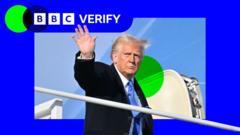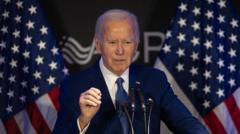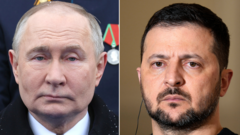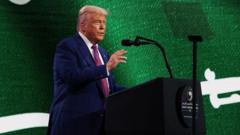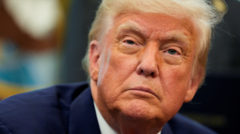In a pivotal meeting, President Trump and Syrian President Ahmed al-Shara addressed U.S. sanctions and steps toward normalizing relations. This marks a significant shift in U.S.-Syria relations after decades of isolation, as al-Shara seeks to stabilize post-rebel Syria.**
Historic Meeting between Trump and Syrian President Marks Shift in U.S. Policy**

Historic Meeting between Trump and Syrian President Marks Shift in U.S. Policy**
President Trump meets with new Syrian President Ahmed al-Shara in Riyadh, discussing U.S. sanctions and a new diplomatic approach for Syria.**
President Donald Trump held a landmark meeting on Wednesday with Syria’s newly appointed President, Ahmed al-Shara, in Riyadh, Saudi Arabia, following his announcement to lift U.S. sanctions against Syria. This marks the first direct communication between the leaders of the two nations in 25 years, highlighting a major shift in U.S. foreign policy. The meeting lasted approximately 30 minutes, coinciding with a summit of Gulf nations.
The White House has described the encounter as a promising moment for Syria, which recently emerged from a brutal conflict that unseated former President Bashar al-Assad. Trump emphasized the potential for al-Shara to create significant advancements in his country, urging him to pursue normalization of relations with Israel and to work towards expelling foreign militants from Syrian territory.
Attending the meeting alongside Trump and al-Shara was Saudi Crown Prince Mohammed bin Salman, who has supported this new diplomatic direction and characterized the lifting of sanctions as a courageous move. President Erdogan of Turkey also contributed to the dialogue via telephone, reinforcing the collaborative effort among regional leaders to stabilize Syria and bolster economic ties.
The Trump administration had, for a significant period, maintained a cautious distance from al-Shara’s government amidst skepticism regarding his leadership, given his militant past. However, al-Shara has taken steps to distance himself from extremist affiliations, positioning himself as a moderate reformer.
The Syrian Foreign Ministry hailed the meeting as historic, accentuating the possibility of a constructive role for the U.S. in Syria’s recovery. Saudi Arabia’s foreign minister highlighted Syria's promise, noting its rich resources and skilled populace as components crucial for economic recovery.
Trump’s Middle East tour marks the first international engagement of his second term, underscoring a recalibrated approach towards Gulf relations after a previously isolationist stance. Trump's connections with regional leaders have facilitated discussions about lifting sanctions, which many see as key to preventing further regional instability.
The meeting reflects both a willingness and an expectation among the Gulf leaders for the U.S. to play a positive role in promoting peace in the region, including initiatives addressing the longstanding Palestinian issue.
As President Trump departed Riyadh for his next stop in Qatar, the implications of this meeting reverberate across both the Middle East and U.S. foreign policy, signaling a potential thaw in relations with a nation long relegated to the margins of the international community.




